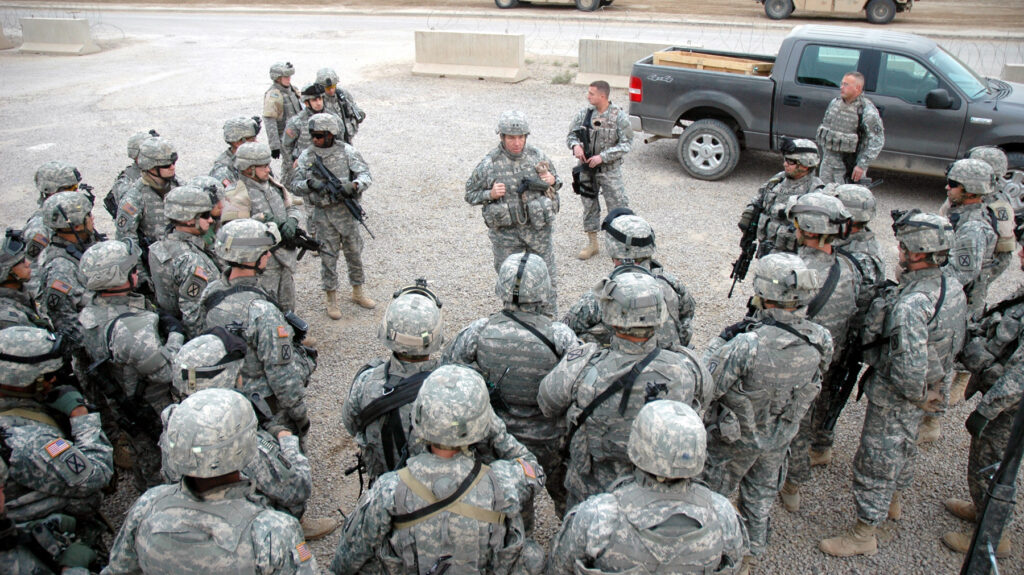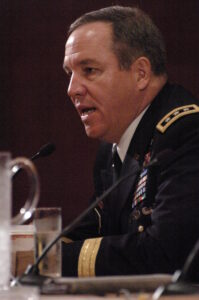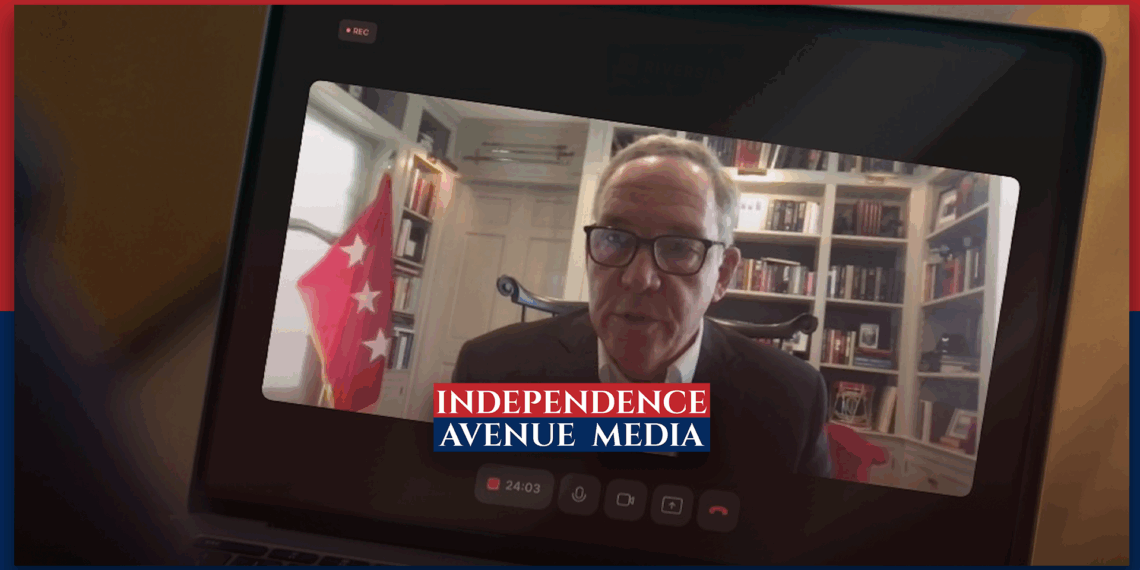Lt. Gen. Benjamin C. Freakley, U.S. Army (Ret.), spent 36 years leading American troops in campaigns from the 1991 Gulf War to Washington’s 13-year Operation Enduring Freedom in Afghanistan. Now he’s helping shape the next generation of leaders at Arizona State University, where he co-founded the Laboratory for Leadership, Diplomacy and National Security.
In a recent conversation with Independence Avenue Media Editor in Chief Ia Meurmishvili, Freakley reflects on recent developments in civil-military relations in the United States, putting recent headlines about the use of the U.S. military in historical context.
Citing the war in Ukraine as a turning point for military innovation, Freakley also says Ukrainian forces have changed the face of modern conflict, rapidly adapting inexpensive new unmanned technologies on the battlefield.
Operation Spiderweb, a series of covert drone strikes carried out last month by Ukraine’s security services deep inside Russia, highlights the real-time adaptive agility of Kyiv’s defense establishment.
“Ukrainians are using GoFundMe to raise money—ordering parts from global suppliers, assembling drones in trenches, configuring them for reconnaissance or kinetic strikes—and they’re taking out 30% of Russia’s strategic bomber fleet,” he said. “That’s amazing.”
It also stands in stark contrast to the slower pace of U.S. military procurement and innovation.
While the nature of warfare hasn’t changed completely, the battlefield—whether land, sea, air, cyber, or space—will continue to evolve at an accelerating pace.
The obvious question is whether the U.S. defense establishment can move fast enough to keep up. Less clear, he says, is whether the cornerstone of U.S. military global dominance—forces trained with the ethical foundation by which to lead with integrity—will remain in place.
The following interview was recorded on July 1, 2025. It has been edited for length and clarity.
Independence Avenue Media Editor in Chief Ia Meurmishvili: Thank you so much for finding the time to talk to us, and welcome to the Independence Avenue Media studio. I really appreciate this.
Lt. Gen. (ret.) Benjamin C. Freakley: Thank you very much for having me. I appreciate your work.
Meurmishvili: General Freakley, what do you think the role of the U.S. military is in America?
Freakley: Well, I think the Founding Fathers got it right with the U.S. Constitution when they said that the United States Congress shall raise and equip an army. The idea behind that thinking was that a part of democracy is having a military that is subservient to civilian control. So one of the principles of our military is that we are responsible to our civilian leaders, who are elected by our people. We are an element of democracy, here to preserve and defend the Constitution against all enemies—foreign and domestic. That’s our basic role. To preserve our form of government, if required.
Meurmishvili: We’re witnessing something that doesn’t usually happen in the U.S.—there are U.S. Marines deployed to California right now. Can you explain that? What happened, and why are they there?
Freakley: Well, first, to back up just for a moment, I think it’s important for people to understand that we have a very serious principle of civil-military relations. That goes back to my point about civilian control of our military. We also have a law—posse comitatus—that prevents the active-duty military from enforcing U.S. law domestically. It’s been used very sparingly in the 250 years of our Army. It was used to enforce integration in the 1950s when the 101st Airborne Division escorted young Black women to school, when a state did not want to enforce federal law on integration. But it’s been used very sparingly.
In this case, 200 Marines were deployed behind the California National Guard. The first step that took place was the deployment of California National Guardsmen, who are actually state military until they are federalized. Then, to back them up, the Marines were sent to guard federal installations.
It’s a question that will be examined—is it overreach or not? There are some issues with it. First of all, the Governor of California [Gavin Newsom] did not request military intervention—he didn’t use his own National Guard, nor did he request the Marines. That was done at the federal level. There was concern that there could be vandalism due to rioting and protests. The president and administration decided to use military force. It’s questionable. In my opinion, when we examine our tradition of civil-military relations, it’s questionable.
The better approach—my recommendation if someone were asking me—would be that if the local and state police cannot handle a situation (and of course Americans have the right to protest, assemble, and speak freely—rights our military defends through the Constitution), then the governor should deploy his own National Guard. If they are unable to maintain order and public safety, only then should federal troops be used—to protect federal property, not to enforce law. I think we’re in a gray zone with the use of our military in this manner. As a soldier, my recommendation would have been: don’t go this way.

Meurmishvili: That’s what I was going to ask you—as a soldier, as a general—could a general or a soldier refuse an order like that when it’s in a gray zone?
Freakley: The short answer is yes. From basic training, when a civilian citizen joins our military, they’re taught right away that there are two types of orders they can—and must—disobey: illegal orders and immoral orders. They have a duty to fulfill their moral obligation. Now, that’s difficult because it assumes a common ethical foundation, which may or may not exist. But soldiers are taught military values, and they’re taught to enforce those values. So even as a general, I can say, “I view that order as illegal or immoral, and I’m not going to follow it.”
Meurmishvili: You were in the military for 36 years before retiring. That’s an incredible career. You’ve seen remarkable things and held important posts in overseas operations. Do you notice a change in how the U.S. military views itself or its role?
Freakley: Yes. When the U.S. military came out of Vietnam, it was a very troubled time. There were anti-war demonstrations, soldiers were told not to wear their uniforms off-post, they were spit on, called baby killers—it was hard.
Von Clausewitz, the European war philosopher, wrote in On War that you need an equilateral triangle between the people, the government, and the military. They must trust each other. That triangle was broken during Vietnam.
It took years to rebuild. I came in right after Vietnam. Many senior officers and non-commissioned officers worked hard to rebuild that trust. It happened because we did a lot of introspection.
We haven’t done that with Iraq and Afghanistan. We’ve moved on to focus on new threats: Iran, North Korea, China, Russia. But we haven’t reflected on how we did and how we can improve.
Meanwhile, the nature of warfare hasn’t changed—war is still man killing man—but the characteristics of warfare are rapidly changing. First it was land, then sea, then air. Now it’s also information, cyber, and space. The battlefield has expanded dramatically.
Our military is trying to find its way through that fog. What technology should we use? How do we redefine the roles of soldiers, Marines, airmen, guardians? What can we learn from Ukraine and how fast can we adapt? We are not fast innovators. It takes 10 years. By then, technology has moved on.
Meurmishvili: Drone technology seems to be the future, at least based on what we’re seeing in Ukraine. They’re using low-cost, high-efficiency drones to massive effect. The Spiderweb drone operation took out 30% of Russia’s strategic bombers. That’s incredible. Is the U.S. military paying attention? If it were up to you, how would you speed things up?
Freakley: You raise great points. First, there’s no magic solution in combat. It’s always about using the tools you have, properly and effectively, to dominate your opponent. Everyone thought they had “the” solution at some point—then someone invented a countermeasure.
I think we have to be careful not to idolize drones. But what’s fascinating isn’t the drone—it’s the whole system. Ukrainians are using GoFundMe to raise money, ordering parts from global suppliers, assembling drones in trenches, and configuring them for reconnaissance or kinetic strike. And then they’re taking out 30% of Russia’s strategic bomber fleet.
That’s amazing. The question becomes: who decides what’s allowed? Who says yes? Who sets limits? Our problem is we’re too slow. By the time we’re ready, the next conflict has already begun. We often prepare for the last war.
We need to explore micro-tech, drone swarms, robotics, AI, cyber, information warfare—all of it. We must overwhelm the enemy with complexity and stop the fight quickly.
Look at the Iran strike—bombers from all directions, a submarine launching cruise missiles unnoticed. That’s strategic messaging. If I were an enemy, I’d be scratching my head, wondering how to counter it. But we have to be faster and more integrated. WWII was won by the Germans early on because they integrated tanks, radios, and aircraft—the French didn’t. If you get the recipe right, it’s a beautiful pastry. Get it wrong, and it’s trash.
Meurmishvili: But wouldn’t America’s opponents also look at Spiderweb and think: look at what Ukraine did with almost no budget? Russia had the second-largest strategic bomber fleet, and drones took out a third of it. How do you counter that?
Freakley: Just as journalists and doctors must constantly study their fields, military professionals must study the art of war. They need to analyze what’s happening and project it forward.
What’s incredible about Ukraine is their national will. Their men, women, and even children are standing firm. You have to ask—how do we marshal that kind of willpower when our way of life is threatened?
Yes, we need to study all militaries, theorists, and think tanks to understand diplomacy, information, warfare—and integrate that knowledge to defend our future effectively.

Meurmishvili: You mentioned galvanizing earlier. So to wrap up, let’s return to where we started. President Donald Trump and the administration—including Secretary of Defense Pete Hegseth—say U.S. military recruitment numbers are going up. You’ve worked on recruitment. What do you make of that? Are Americans viewing the military, the administration, or the military’s role differently?
Freakley: Too early to tell. I spent my last four and a half years in charge of the Army’s basic training, recruitment, ROTC, officer candidate school—all of it.
Recruiting dipped recently. The administration says numbers are coming back. That’s good. But there are concerns. Twenty-five percent of new recruits don’t complete their first term—whether that’s two, three, or four years.
Only 22% of those aged 18 to 24 qualify to serve due to health, conduct, or education issues. There’s also broad mistrust in government—not just this administration, but historically. Young people today are informed, educated, and they know their worth. They’re choosing where to give their time—and not necessarily to the military. We need to shift the narrative. Serving was an honor. The people I served with were ordinary people who did extraordinary things. Many of them loved peace, but if called, they’d defend our way of life.
We must refocus the story—from problems in the military to the honor of wearing our flag. It’s a noble profession. And in time, we’ll understand what’s driving the numbers.


